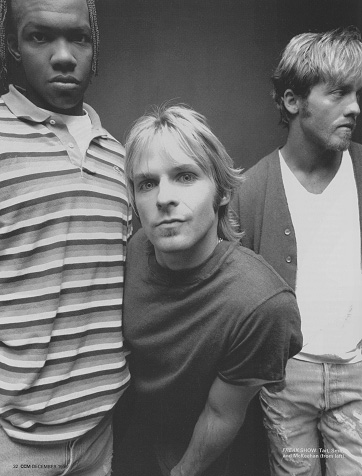
Thursday, October
12, 1995.
God answers prayer.
Finally,
he notices me. Kevin Smith acknowledges me waiting by the giant garage door
backstage as the tireless roadies load out light tressels looking like barren
winter trees, miles of heavy audio cable and enough duct tape to save any Apollo
mission. And while Kevin's glance could be every woman's dream (forgive the
generalization), my single desire is to be assured that I won't be left behind
in Carbondale, Illinois. It's a legitimate fear I have when traveling on the
road with a band. With my own transportation, I am the king of the road.
But the only kings here are DC Talk, the Jesus Freaks who finished their latest
release around two o'clock in the morning on October the second or third (they
were too tired to remember), then flew to California's City of Angels the next
day to shoot the "Jesus Freak" video with Grammy Award-winning producer
Simon Maxwell (who has shot, oh, Nine Inch Nails, for example) for 14 hours,
only to head back out to LAX, catching a plane to Colorado to embark on the
fall warm-up leg of the Jesus Freak tour-with no rehearsal time with
the band. They are either professionals, or really lucky live artists.
That was five days ago. Today I hook up with the guys at the Southern Illinois
University Arena. And while there are no SIU Salukis guarding the entrance to
the sporty blue house on wheels, I am not about to set foot on the bus without
being accompanied by an adult. Kevin is real close to the latter.
Stepping onto a tour bus is like stepping into your grandmother's mobile home,
only cooler. The paneling is still fake, the couches are tasteful and comfy.
The audio/video equipment is better. Like the gracious host he is, Kevin shows
me to my three by six foot bunk, a top one of course. The lower sleeping bunks,
more suitable for countering the perpetual motion of the bus during slumber,
are already wisely claimed by the regulars. Now traveling down the road, settled
with a can of Pepsi in the front lounge/dining area, the trio of Kevin Smith,
Michael Tait and Toby McKeehan share what it used to be like for DC Talk on
the road.
"When
we started out, we toured in a shuttle bus, much like the ones you see at the
airport, taking you from the main terminal to the parking lot," Michael
recalls. "We slept in the back of that thing. Meanwhile, a guy named Greg
Jackson, a tall thin African-American male...," "Who blew his nose
constantly," interrupts Toby, "drove the bus." The guys are tripping
merrily down memory lane. Kevin laughs, pointing to Toby, "When we were
asleep at night we would hear the gravel hitting the sides of the bus. Toby
and I would wake up. Mike could sleep through it." "No, Mike would
wake up," Michael defends. Debating who was too lazy to get up, Kevin continues
providing convincing sound effects, "We would hear the gravel hitting the
sides of the bus, like in the middle of the night, at four in the morning. We'd
get up to the front and this guy was listening to praise music! He'd be like,
clappin' his hands together all the time." "No hands on the wheel,"
deadpans Toby. Kevin continues, "And I'd look at Toby and go, 'Toby how
can he clap his hands and drive us?'"
How times have changed. Now two shiny white semi trucks and three tour buses
cart the DC Talk entourage of roadies, tour/management personnel, a six-piece
band, equipment and the guys across the country.
"But the demands are much different now," explains Michael. "After
a show we're usually thrust into a room full of people, and we sit and talk
sometimes for an hour or two after a full night of a headlining show, which
is about two hours." "Two and a half," yells Toby from the phone
booth-esque bathroom. "Thank you Toby. And there's a lot more demands even
than that, you do interviews during the day, in bookstores, so obviously the
pressures are greater. You used to come out on stage, and do 15 minutes of music,
and you'd walk back in your little bus and travel home, or travel on."
"Or you work the merchandise tables so you can afford to get to the next
show," adds Toby emerging from the water closet.
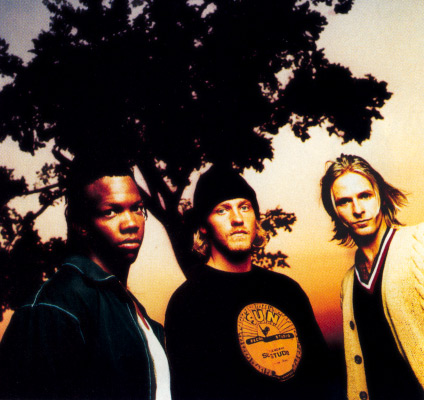 And while the demands are different, so are the rewards. A platinum album, a
Grammy, two gold records, Billboard accolades and appearances on "Entertainment
Tonight," "Arsenio Hall" and the "Tonight Show" have
their privileges. Still, the mission remains the same. "DC Talk's purpose
is to do one thing, to share our faith with people through our music,"
says Toby. "At the same time, we obviously entertain. That's part of who
we are, and we enjoy it. Our goal is to use our music to ultimately point people
to Christ. But we are not called DC Talk ministries, we're called DC Talk Inc.
We are not ordained ministers. We entertain and encourage."
And while the demands are different, so are the rewards. A platinum album, a
Grammy, two gold records, Billboard accolades and appearances on "Entertainment
Tonight," "Arsenio Hall" and the "Tonight Show" have
their privileges. Still, the mission remains the same. "DC Talk's purpose
is to do one thing, to share our faith with people through our music,"
says Toby. "At the same time, we obviously entertain. That's part of who
we are, and we enjoy it. Our goal is to use our music to ultimately point people
to Christ. But we are not called DC Talk ministries, we're called DC Talk Inc.
We are not ordained ministers. We entertain and encourage."
The hour is late. Dinner--spaghetti served in carry-out tin foil containers--rests
comfortably in our stomachs. There's no fear about getting to the next show
this time. There's a bear listening to Gloria Estefan in the driver's seat.
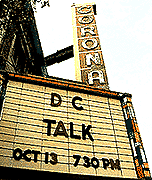 With
the runner AWOL, a chain-smoking cabby finally arrives to take us back to the
theatre. After a brief sound check, the guys and I gather on the bus for a balanced
chicken and vegetable dinner. The "new" sound of Jesus Freak
is at the center of our conversation.
With
the runner AWOL, a chain-smoking cabby finally arrives to take us back to the
theatre. After a brief sound check, the guys and I gather on the bus for a balanced
chicken and vegetable dinner. The "new" sound of Jesus Freak
is at the center of our conversation. "People see
many portraits of DC Talk on this record," Kevin explains. "[The song]
'Jesus Freak' is an aggressive portrait. DC Talk has always been very up-in-your-face
about what we believe in and how we position ourselves as people. But I think
that musically when people hear the rest of the record, they will understand
more where we lie right now. We have not gone down the road to alternative grunge
as much as they think we have.
"We are trying to face who we are. We're a strange band, let's just face
it. We're three different individuals. We come from three different backgrounds
musically. We've all kind of latched on to the alternative thing in the last
two years. But none of us are [exclusively] alternative grunge listeners. That
is not what we'd want this band to be."
Explains Toby, "The bottom line is that we have matured artistically, and
we have matured mentally. With that maturing comes change. Therefore our musical
tastes and our musical desires and aspirations change with that. I think this
is who we are in 1995-96."
| Toby McKeehan - "We went into the studio with no formula this time and said musically whatever comes out comes out, keeping our same goal in mind, to use our music to point people to God." |
Toby continues. "From a writing standpoint, I think we came into this thing
bright-eyed and bushy-tailed, kind of like, 'Here we are.' I think we have learned
a lot in life's experiences from being on the road to having our expectations
smashed sometimes, to kids putting us upon a pedestal at times, to relationships
we have had in the past-business and personal. I think we have been through
some things that make us write a little more introspectively. Spiritually, we
have grown. We have been going through a metamorphosis for several years.
"We are looking at our hearts: Are we truly trusting in God? Does my faith lie in
Him, or in my confidence to do the right thing, or my ability to sway the people,
or my looks or all those things that we used to count on? Suddenly, we are looking
at our hearts. We have a long way to go at being Christ-like, but it is all
those things that have truly shifted our writing to a more introspective state."
But is it a personal reflection from Toby, Mike and Kevin?
Toby cuts to the core of their desire for the project. "We are talking on this album of the real struggle in a pursuit of holiness. All of us share in that struggle. The pursuit of holiness is the struggle with every believer. Yeah, I wrote the lyric to 'What If I Stumble?,' but it doesn't matter that Charlie Peacock wrote the lyric to 'In the Light.' It is my struggle, too. It is all of ours'. The album is not so much personal as it is introspective."
Mike shares a
story about a woman accusing the group of selling out with the alleged new sound,
which raises a key characteristic of DC Talk: They seem willing to challenge
and question the culture yet they haven't withdrawn from the culture. I ask
them if that is a conscious decision.
"We can't help it because the culture is in us. We are the culture,"
explains Michael.
Toby excitedly jumps in. "That's a great statement! That is exactly what
we want to be. We want to be missionaries to a generation so we have to understand
the culture and live in the culture on a day to day basis before the people
are even going to listen to us. It is absolutely conscious because that is the
only way it will work."
Michael isn't finished. "To me, that is the Great Commission: To go into
the world and not be of the world but in the world because you physically are.
You have no choice. And so when we do music, it is great if Christians enjoy
it. It is great if it encourages them along in their walk, and it changes their
lives. But Jesus didn't hang out in the churches all the time. He hung out in
the weird places, and He hung out with people who were ostracized by society
and the freaks because they were the ones that needed to hear. He tried His
best to understand their culture, to walk in their culture but to shed light
on all they were missing out on."
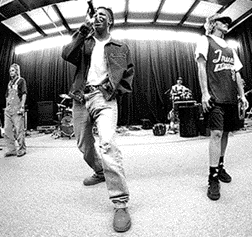 Leaning
away from the window to check the rapidly approaching performance time, Kevin
explains his feelings. "I think it is unnatural to my spirit to want to
segregate what we have. Why segregate something that is almost like food to
the hungry? I was just sitting in a laundromat today talking to a street guy
that is totally unhappy, living underneath the bridge every night. He has no
money in his pocket, has been divorced several times. I am sitting there going,
'I am a happy guy compared to others.' Even if I wasn't a traveling singer,
I would be happy because I have the joy of knowing that when I die that I am
going somewhere-that eternity is built on hope and faith. I wanted to give that
to him. I wanted to pass it right into his blood. To me it is unnatural to want
to segregate that. It is unnatural to want to put faith in a box and make it
a club."
Leaning
away from the window to check the rapidly approaching performance time, Kevin
explains his feelings. "I think it is unnatural to my spirit to want to
segregate what we have. Why segregate something that is almost like food to
the hungry? I was just sitting in a laundromat today talking to a street guy
that is totally unhappy, living underneath the bridge every night. He has no
money in his pocket, has been divorced several times. I am sitting there going,
'I am a happy guy compared to others.' Even if I wasn't a traveling singer,
I would be happy because I have the joy of knowing that when I die that I am
going somewhere-that eternity is built on hope and faith. I wanted to give that
to him. I wanted to pass it right into his blood. To me it is unnatural to want
to segregate that. It is unnatural to want to put faith in a box and make it
a club."
Toby agrees. "Yeah, that doesn't make sense from our stand point. It never
made sense to us. We have always wanted to go out and tell the world. If you
find something good that works in your life, you want to share it with people
that don't know about it. Why are you sharing it with people that do know about
it?
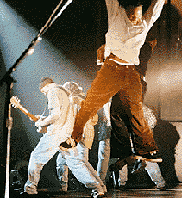 "We know that Christians will be entertained, and we hope that they will
be encouraged. Hopefully they will be challenged and edified, but at the same
time that is not our focus. What dictates what we do is the call of Christ to
go into the world and share our faith. That is what we have a desire to do as
long as we don't cross a moral line."
"We know that Christians will be entertained, and we hope that they will
be encouraged. Hopefully they will be challenged and edified, but at the same
time that is not our focus. What dictates what we do is the call of Christ to
go into the world and share our faith. That is what we have a desire to do as
long as we don't cross a moral line."
Toby adds, "That's not to say that if Mike and Kevin do something [solo]
someday they might change lyrically. But I don't care what you do, you can't
take Christ away from them. I think there has got to be a middle ground. I think
there is a way to still continue to live in a Christian music world, but also
to be salt in the world. I don't know that that has been done properly yet.
I think Amy [Grant] has toyed with it. I think Michael [W. Smith] has toyed
in it. I think The Choir has toyed in it. There is a way to do it without really
getting either side frustrated with you, or maybe you just get both sides frustrated!
What's important is that we walk in love.
"I hope that people will listen to our record with an open mind because
there will be some stereotyping going on. Listen for depth, see if it's there.
Don't automatically assume that you know we're the same guys that we were three
to six years ago. Give us room to grow."
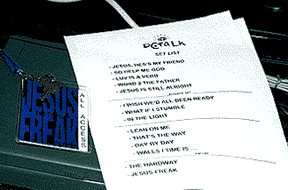 Reflections from the Green Room
Reflections from the Green Room